“If it’s true what’s reported [about Mel Gibson‘s anti-Semitic tirade], frequently hatred, bigotry and prejudice, which is controlled, explodes at moments of stress and crisis,” Rabbi Abraham H. Foxman, national director of the Anti-Defamation League, has told N.Y. Times reporter Allison Weiner. “Liquor loosens the tongue of what’s in the mind and in the heart, and in his mind and in his heart is his conspiracy theory about Jews and hatred of Jews.” Or to put it succinctly, “in vino, veritas.”
Day: July 29, 2006
Joining Gossip Ranks
Watchers of Movie City News‘ front page may have noticed that David Poland has removed the link to Hollywood Elsewhere (which he always called “Jeffrey Wells”) from the Columnist links and has placed me under the Gossips, alongside Nikki Finke, Mark Ebner and Rush & Molloy.
No slight to the aforementioned (they’re all stand-up pros), but David seems to have shifted me out of the Columnist category (where my link has been sitting since ’02) because I’ve changed the HE format to emphasize the bloggy shorter-item stuff on top of my twice or thrice-weekly features, and — take this to the bank — because Poland is doing another one of his judgmental Rabbi Dave slapdowns, which are part of his basic M.O.
It’s an arbitrary call. Anne Thompson‘s RiskyBiz blog, which does pretty much the same thing as Hollywood Elsewhere (minus the colorings of my personality and the supplantings of her own, of course), is still listed among MCN’s Columns. Like Anne does with her regular Hollywood Reporter “Risky Business” column, I still run longish features except usually twice weekly (and sometimes even thrice) in addition to the short stuff.
Nothing has changed in terms of the longer pieces I’ve always done. And as Poland well knows, thousand-word dig-down pieces along the lines of, say, the new Taschen book about Roman Polanski or a coming indie superplex from Landmark or an explanation why the Snakes on a Plane cool factor is over are not commonly seen on Ebner’s or Rush & Molloy’s columns, or on Defamer or Page Six.
I’ve thrown stuff out there from time to time because it was “out there” and part of the hurly-burly and therefore allowed for a dissection of some kind, but I’ve never thought of what I write as gossip. HE has always been a kind of X-factor thing, but it’s mainly been about reporting, trend-spottings, early calls, straight reviews and attitude-personality. My point (and it’s okay to disagree) is that HE’s new MCN category has as much to do with David Poland’s high horse and that little chunk of broomstick lodged in his posterior cavity as anything else. This also has a little bit to do with it also, I think. And also this.
“Superman II” DVD
I don’t get why Warner Home Video is issuing their all-new DVD of Richard Donner‘s cut of Superman II — a fresh construction of the 1980 film — in late November. Because they figured everyone would be….what…Superman-ed out by late summer? I’m into seeing it now. Who wants to wait for Thanksgiving?
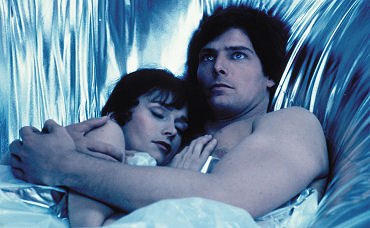
Donner never got to do his own cut because the notoriously eccentric producers of the first Superman series (Alexander and Ilya Salkind) dismissed him and hired Richard Lester to finish the sequel instead of Donner. The new DVD will have all kinds of restored footage (including some with Marlon Brando), some Chris Reeve audition footage, Donner’s feature commentary and introduction, a featurette, and deleted scenes.
Scaggs “I’m Easy”
Has anyone ever heard this song “I’m Easy” over the closing credits of any movie? No, not the Keith Caradine song from Robert Altman‘s Nashville but a Boz Scaggs tune off his 1970 “Boz Scaggs” debut album. I can’t remember which film it is, but I’m 85% sure I heard this tune on a soundtrack of some early ’80s film. I thought I might be Hal Needham’s Sugar Tits (1985) but I checked and I was wrong.
“Truth” Weather Ad
A 7.28 L.A. Times piece about how Paramount Classics marketers played the “swelter card” for Al Gore‘s An Inconvenient Truth by running a recent ad that asked, “How hot is your city today?” atop a blazing sun and bright red background. The ad reminded everyone that it had recently been 99 degrees in New York, 104 in Salt Lake City and 108 in Phoenix. The ad also ran reminders, according to Kelly-Ann Suarez‘s story, that “the Earth’s temperature is at a 400-year high, that the first half of 2006 was the hottest in history and that melting ice caps spell trouble for coastal cities.”
Pevere rants at H’wood
“When it comes to mass-market moviemaking, and especially at a time when the average cost of a studio release is creeping toward $200 million U.S., there is no room for originality in Hollywood. Never was and, barring some kind of wholesale revolution in industry thinking, never will be. It’s not wanted and, for the time being at least, not needed: after all, this summer’s most popular movie is also this summer’s most tediously uninspired, by-the-numbers retread: Pirates of the Caribbean: Dead Man’s Chest. I mean jeez, even suggesting Hollywood isn’t original isn’t original. In some form or another, the point itself has been expressed so often it’s a clich√É∆í√Ǭ©. The difference is, you can’t get rich by repeating it. And that’s what separates Hollywood’s lack of inspiration from my own.” — the Toronto Star critic Geoff Pevere writing a feisty, original-sounding retread of a generic piece about why so many Hollywood movies blow the big one.
Deep Polanski
Deep Polanski
Over the last couple of weeks I’ve been reading “Roman Polanski” (Taschen), an eye-filling and genuinely inspiring review of one of the greatest living filmmakers of our time. It runs 192 pages, and I wouldn’t have minded an extra 100 pages or so. I have no problem with calling it the most insightful, alluring and fetchingly phrased book about Polanski ever.
The photos, selected by editor Paul Duncan, are exceptional but F.X. Feeney’s smoothly written 30,000-word essay is the soul of it. The book is a peach and a picnic for lovers of “Repulsion”, “Knife in the Water”, “Rosemary’s Baby”, “China- town”, “The Pianist”, “Macbeth”. It even made me want to return to “Frantic”, which I bought into because I found it impossible to believe that Harrison Ford would marry Betty Buckley.
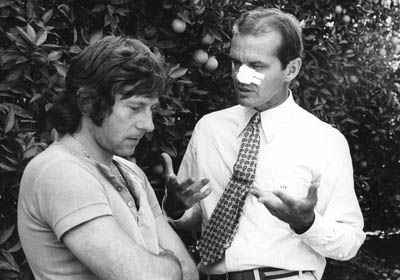
Roman Polanski (l.) and Jack Nicholson during the making of Chinatown (1974)
One look at “Repulsion”, which I first saw in my early 20s, and it was clear Polanski knew how to sock it to you but good. That rotting rabbit on the plate, the bleeding cuticle of that old woman in the beauty salon, the man briefly reflected in the closet-door mirror, that loudly ticking clock, the cracking walls — Polanski was a guy who knew from nightmares and had a knack for conveying creepiness and perversity in a way that anyone could feel.
The idea you always get from any Polanksi film is that life is not to be trusted, unsafe…teeming with predators. Feeney’s copy notes that “the ghostly truth [behind his films] is that Polanski was orphaned by the Nazis and wandered Poland alone from ages 9 to 13. In each of his films, the omniscient viewpoint feels ‘childlike’ in the least innocent sense: we listen and watch…wary of what’s been hidden or is being planned in secret,…one’s survival (even within the playful confines of a fantasy) depends on not missing so much as one detail.”
< ?php include ('/home/hollyw9/public_html/wired'); ?>
I’ve been talking to F.X. about doing an interview about the Polanski book since mid June. Last week I hit upon the idea of simply writing out a few e-mailed questions and having F.X. write back. His replies came in yesterday and here they are:
HE: How long did it take you to research, write, and then re-write everything? How many words? When did you do the work?
Feeney: I worked from October 2003, to early May 2004. Mind you, I had been researching it since the late `60s and early `70s, when I was in my late teens. Polanski was a very early hero of mine. I have always felt at home in his films. There was never any need to ‘interpret’ his movies, as with other greats.
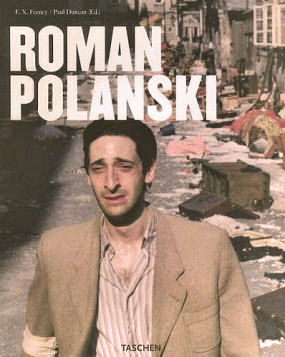
“The only way I could make sense of 2001: A Space Odyssey when I first saw it was to try and understand the ‘meaning’ of the monolith. Polanski was immediately involving, by contrast. If you’ve ever felt scared while you’re alone in a house, Repulsion and Rosemary’s Baby make instant sense. Any kid, any grownup, can watch and be perversely tickled by firsthand knowledge of what those poor heroines are feeling.
“My hands-on research began as I tramped around Poland in late November and early December of 2003. I visited the house where Polanski lived in Krakow, prior to the Nazi invasion. A local guide — a wonderful character who calls himself ‘Bob of Bobtours dot com’ — drove me to Wysoka, in the Tatras mountains south of Krakow, where Polanski hid out after escaping the ghetto at age 9.
“A 90 year-old camp survivor living up in those hills remembered the family Polanski boarded with, and directed us precisely to the spot where their hut once stood. (‘Three bus stops past the church, to where a long road curves up to the right.’) A photo I took of that place is in the book — along with another I took of the ‘half lion, half dragon’ Polanski remembers over the door to the house where he spent his few happy times as a kid.
“The following week I went to CAMERIMAGE, a magnificent, intimate, world-class film festival devoted to honoring cinematographers, and held each year in Lodz, Poland. Polanski attended the film school at Lodz — pronounced ‘Woodge,’ and fondly nicknamed “Hollywoodge” by partisans of the festival.
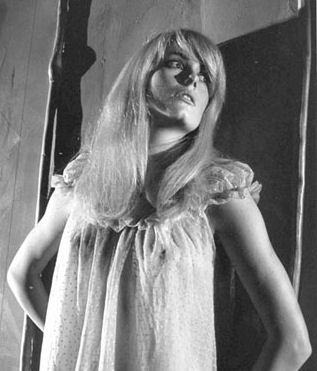
Catherine Denueve in Repulsion (1965)
“There, in addition to hobnobbing with David Lynch, Peter Weir, James Ivory, Christopher Doyle and an army of great cameramen and young filmmakers, I ran into a wealth of Polanski’s old schoolmates, and was even given a tour of the film school, which is still thriving. “Polanski always sat there, on the seventh step,” the rector told me as we climbed the wide staircase to the screening room, where the students used to hang out and socialize by the hour.
HE: How did you speak with Polanski? (Over the phone, I presume.) How many conversations? How long did the interview process take?
Feeney: “There were no conversations with Polanski. When I first reached out to him, through a mutual friend — film director Hubert Cornfield, now deceased — Polanski’s response was courteous but absolute: ‘I hope never to be interviewed, ever again.’
“Truth is, Polanski has dealt with everything in print over the past 40 years, be it the Nazis’ murder of his mother, the Manson gang’s massacre of Sharon Tate and his unborn son, even the incident of ‘unlawful sex with a minor’ (which is the actual wording of the crime for which he pled guilty — not statutory rape), and the question of whether or not he’s coming back to America — he’s dealt with all of it, exhaustively, in print and on TV, again and again.
“A fellow Polanski scholar, Paul Cronin — editor of ‘Roman Polanski: Interviews’ — shared an indispensible bulk from his archive. But above all there is Polanski’s own 1984 autobiography, which is blisteringly honest. I decided to fuse these countless fragments into a coherent mosaic while focusing primarily on the films.
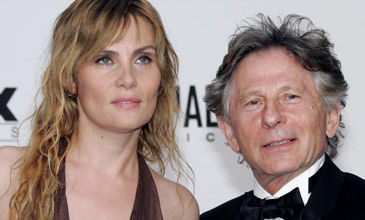
Polanski’s wife and actress Emmanuelle Seigner with Polanski two or three years ago
“Polanski did cooperate very generously in terms of providing access to the rare graphic images at his office that my editor Paul Duncan gathered for his superb layouts. Polanski never intervened, though he did review the text for factual inaccuracies. In my original draft I had written that Wysoka is 35 kilometers south of Krakow — he changed that to 40. He adjusted one or two other things of that nature. Otherwise, his stance was a respectful ‘no comment,’ good or bad.”
HE: What film is he proudest of at this stage? My guess is The Pianist, but maybe it’s Knife in the Water or Cul de Sac.
Feeney: “Cul de Sac is his favorite, of record — everything that is most pure and original in himself is in that film, although it was hell to make. (Uncooperative weather, bedbugs at night, moody actors.) His two favorite working experiences were Chinatown and The Pianist — in each case, he enjoyed the unwavering support of his backers, cast and crew.”
HE: What is your favorite Polanski film personally? Which of his films do you think is the greatest? And why?
Feeney: “This is like asking me my favorite Beatles song. (Actually, that would be ‘You’ve Got to Hide Your Love Away’ — but do we have to sacrifice all the rest?)
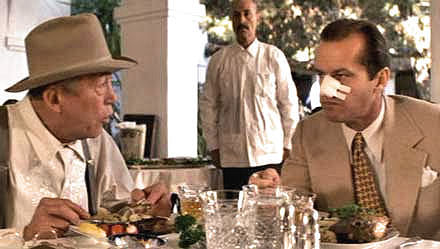
John Huston, Jack Nicholson in Chinatown
HE: Will Polanski ever return to this country?
Feeney: “The great misconception I try to correct in the book is the question of why he’s in exile. Several times, lately, in a number of venues, I’ve come across erroneous newspaper accounts which say ‘Polanski fled the US to escape arrest.’ No — he pleaded guilty, took full responsibility, even did prison time and stood ready to pay a hefty fine. Unfortunately Judge Laurence J. Rittenband reacted badly to the overheated media coverage. The day after Polanski was released from Chino [state prison], Rittenband reneged on the careful deal worked out with the prosecutors and arbitrarily threatened Polanski with further and unlimited jail-time. The judge’s freakout became contageous and Polanski boarded the next jet out of Dodge. (See pages 109 and 111 of my book.)
“As for his present exile, and his chances of returning: Remember The Exterminating Angel, the Bunuel classic in which dozens of wealthy people are trapped at a party for 40 days and 40 nights (eventually resorting to cannibalism), all because nobody wants to be thought rude by being the first to leave? That’s Polanski’s position. He pleaded guilty, he did time, he made amends — through civil courts, he settled with the young woman in the late 1980s / early 1990s. The way is technically clear to an amnesty, but nobody in power wants to be the first one to let him off the hook.
HE: My favorite Polanski scenes are in Repulsion. The loud ticking clock as Catherine Deneueve lies in bed, terrified that an intruder will come into her bedroom, etc. And the arms and hands shooting out from the walls and grabbing her. What are your favorites?
Feeney: “I’m with you in loving Repulsion, through and through. As for Cul de Sac, I would call your attention to a few things — particularly the long magical interlude on the beach at daybreak, all done in one breathtakingly sustained complex master shot. There, Donald Pleasance, Lionel Stander and Francois Dorleac — Catherine Deneueve’s elder sister, dead in a car crash later in 1966 — get along peaceably for a change. It’s subtle, but the rest of the movie’s emotional power is energized by this little truce.
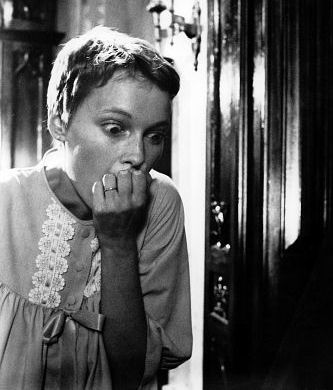
Mia Farrow in Rosemary’s Baby
“In Chinatown, pick any scene. My favorites tend to involve John Huston — but as Robert Towne points out, check out and savor any scene in where the characters (and ourselves) are obliged to wait. Take the moment when Jake is rudely forced to wait all day in a Water & Power honcho’s outer office. He persists in waiting — to the great irritation of the secretary. The same goes, more famously, for the little showdown through gritted teeth with the clerk at the hall of records. Who among contemporary directors would have the bold audience sense to try such scenes, much less pull them off? Paul Thomas Anderson comes to mind, but otherwise? Almost no one.
“Polanski’s last five films are all great, in my opinion. Bitter Moon (1992) is a sexy wonder, Death and the Maiden (1995) a magnificent thematic follow-up to Chinatown particularly as articulated by Noah Cross (Huston) to Jake Gittes, when he says: “Most people never have to face the fact that, under the right circumstances, they’re capable of anything.” Ben Kingsley, Sigourney Weaver and Stuart Wilson give three exceptional performances that demonstrate precisely that horrible truth. The Ninth Gate (1999) is a hoot.
“The Pianist (2002) and Oliver Twist (2005) constitute twin valedictories — the former recreates the historic reality of Polanski’s childhood with a vital fidelity, and the latter catches the inner reality of his childhood — at large in a hostile universe, but protected by an indestructible optimism.”
Wells addendum: I have one beef with the book, which is the cover photo — a shot of a tearful, devastated Adrien Brody in The Pianist walking down a littered street. This is not Polanski to me — a man full of grief and pain. Polanski, to me, is the crafty jackal, the brilliant manipulator, the pervy purveyor of the sinister. Polanski is not about boo-hoo but heh-heh. He’s the scared little boy who probably once said to himself, “I’ll escape the clutches of those Nazi bastards, and then I’ll come back when I’m older and make brilliant films and scare the shit out of their sons and daughters and then make them feel ashamed of their parents…hah!”
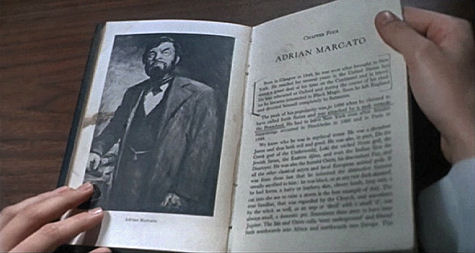
** Feeney is also the author of Taschen’s forthcoming Michael Mann book, due on 9.5.06.
Mel Apologizes
I first saw this via Anne Thompson‘s RiskyBiz blog, but here’s Mel Gibson’s apology statement about what happened in Malibu yesterday with the DUI and the reported anti-Semitic and “sugar tits” comments: “After drinking alcohol on Thursday night, I did a number of things that were very wrong and for which I am ashamed. I drove a car when I should not have, and was stopped by the LA County Sheriffs. The arresting officer was just doing his job and I feel fortunate that I was apprehended before I caused injury to any other person. I acted like a person completely out of control when I was arrested, and said things that I do not believe to be true and which are despicable. I am deeply ashamed of everything I said. Also, I take this opportunity to apologize to the deputies involved for my belligerent behavior. They have always been there for me in my community and indeed probably saved me from myself. I disgraced myself and my family with my behavior and for that I am truly sorry. I have battled with the disease of alcoholism for all of my adult life and profoundly regret my horrific relapse. I apologize for any behavior unbecoming of me in my inebriated state and have already taken necessary steps to ensure my return to health.”
Herzog on things lost
“There is hardly any arthouse theatre left [in the U.S.], but I have a feeling that Hollywood is looking very closely at what I’m doing right now because in all these big action films with all the great special effects, real storytelling and real beauty and human depth are getting lost.” — Rescue Dawn director Werner Herzog speaking to The Australian‘s Rosalie Higson.
Ariagga on Tarantino
“I’m happy you brought up [Quentin] Tarantino. They say that I [am] influenced [by] Tarantino, so I had to go and rent Tarantino movies to see who was my influence. I think Tarantino belongs to the other kind of writers. It’s clear that he hasn’t suffered real violence in his life. I don’t have that sense of smell. I was cut by a knife before I was 14. So I know that violence is real. My cinema has nothing to do with Tarantino. You want to see one American influencing me? Go to William Faulkner.” — Babel screenwriter Guillermo Ariagga (also the writer of The Three Burials of Melquiades Estrada, 21 Grams, Amores perros) speaking to SF 360 writer Michael Fox.
Watch that bottle
They always say “never hold a drink in your hand when posing for a press photo” — here’s why. Little Miss Sunshine co-director Jonathan Dayton (l.) appears to be holding a bottle of Perrier, but the mere presence of a bottle in his right hand plus that vaguely smirky expression on his ruddy bearded face (he looks half-bombed) plus the straw pork-pie hat doesn’t make for a winning combination. If he’d put the bottle down and buttoned his jacket he’d be fine.
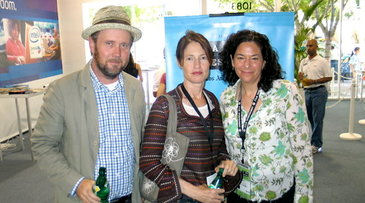
Sunshine co-director Valerie Faris (center) is also holding a Perrier bottle, but with both hands as if it the bottle is a piece of sculpture or an award she’s just won, and that makes all the difference. The lady looks sharp, elegant and reserved, like an art-gallery owner. L.A. Film Festival programming chief Rachel Rosen (r.) isn’t holding anything, and thank fortune for that.
Friday numbers
Miami Vice did $8.8 million yesterday (Friday,7.28) with a projected $26.5 million by Sunday evening. Universal is probably going to end up with a gross of roughly $75 or $80 million at the end of the domestic run, which they’ll keep about 50% of which probably won’t cover their p & a (prints and ads) outlay. There’s foreign and video, of course, but there’s no way this Michael Mann pic, which cost over $135 million to make, isn’t a disappointer. A shame, too, for a film as rich and pleasurable as this one is — a rare instance of a sensual and sophisticated adult popcorn movie.
Pirates 2 was #2 with a $5,828,000 Friday and a projected weekend tally of $20,369,000. (Total domestic gross so far is $358 million.) John Tucker Must Die, a total stinker with the critics, came in third with $5,530,000 and a projected Sunday night tally of $14,106,000. Monster House was fourth with $3,589,000 and a projected weekend cume of $20,786, 000…off 46% from last weekend. The fifth-place The Ant Bully didn’t open (another black mark for WB marketing): $2,623,000 Friday, and a projected $7,774,000 by Sunday night.
WB’s Lady in the Water dropped 61% from last Friday, earning $2,230,000 yesterday for a projected $7,101,000 by Sunday night. Not only is M. Night Shyamalan’s drama not going to make $50 million, but it’s looking like it may be a push to hit $40 million. Add up Lady‘s failure, the weak Ant bully opening, the Poseidon mega-flop and the underperforming of Superman Returns (which is at $184 million but is losing screens big-time and is basically out of business) and we may be looking at an upper-level management situation with some rolling of heads down the road.
Another significant opening was the limited (seven theatres in N.Y. and L.A.) bow of Fox Searchlight’s Little Miss Sunshine. I’ve got $103,000 for Friday and a projected $359,000 by Sunday night with a per-print average of $51,000. (It opened on Wednesday, 7.26.) That’s very good. Definitely a hit so far.
